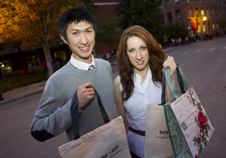
Northeastern undergraduates Kelly Benoit (right) and Adrian Van are working to educate their classmates about plastic-bag pollution. Photo by Mary Knox Merrill.
Every year, more than one trillion plastic bags are circulated across the globe — roughly one million every minute. Northeastern students Kelly Benoit and Adrian Van are working to reduce that number, starting on Huntington Avenue.
Benoit got interested in reducing plastic-bag pollution while working on co-op this fall at Environment Massachusetts. The citizen-based environmental advocacy organization aims to make Massachusetts the first state to ban the use of plastic bags, and is working to construct a bill to ban non-compostable plastic bags, starting in grocery stores more than 5,000 square feet in size.
In her co-op position, Benoit is working to raise awareness of the environmental problems plastic bags cause and encourage Massachusetts residents to take a stand. Just one bag can take up to 1,000 years to degrade, and in that time, creates pollution and poses as an environmental hazard to wildlife.
“It’s crazy when you realize that something we use for five minutes can take hundreds of years to break down,” Benoit said.
But Benoit also saw an opportunity to engage her Northeastern classmates about this issue. So she teamed up with Van, the Student Government Association (SGA) representative for the Husky Environmental Action Team (HEAT), and together, they are working to educate students and raise awareness on campus. Ultimately, they hope to eliminate the use of plastic bags campus-wide.
The students, both political science majors, said plastic bags are overused by businesses such as grocery stores, retail shops and restaurants. Yet, Benoit and Van said that many students are not aware of their harmful effects. HEAT focuses on environmental sustainability by educating and promoting energy-saving practices to the Northeastern community. Van said the effort to ban plastic bags aligns with that mission.
“Plastic bags are detrimental to the environment. They contaminate our water and soil, pile up in our landfills and emit an immense amount of carbon into our atmosphere when they are produced,” Van said.
Benoit and Van also plan to partner with other area intuitions and organizations to promote the cause to the student population citywide.
“Getting students involved in this issue is important because collectively, we can work together to make reusable bags a trend,” Benoit said. “‘Going Green’ is contagious, and by starting with the Northeastern community, we hope our efforts will catch on within the larger community.”
Northeastern’s own commitment to sustainability — one of the university’s top research themes — is evident across a wide range of programs and practices. As part of the “Be Green” initiative, Dining Services has switched to 100 percent recyclable, biodegradable bags at all campus locations. Reusable bags are also sold across campus at all retail locations and HEAT distributes free reusable bags at campus events and meetings.
For more information, please contact Lauren Dibble at 617-373-5460 or at [email protected].
Northeastern University’s College of Professional Studies (CPS) is committed to providing career-focused educational programs that are designed to accommodate the complex lives of motivated learners. Offered in a variety of innovative formats, CPS courses are taught by accomplished scholars and practitioners who have real-world experience. The result is an educational experience founded on proven scholarship, strengthened with practical application, and sustained by academic excellence.
Northeastern University is a global university with a tradition of partnership and engagement that creates an innovative, distinctive approach to education and research. Northeastern integrates classroom studies with experiential learning opportunities in 70 countries, and pursues use-inspired research with a focus on global challenges in health, security, and sustainability.